
Revive Stronger
The Ultimate Guide: Using the scale for body composition management
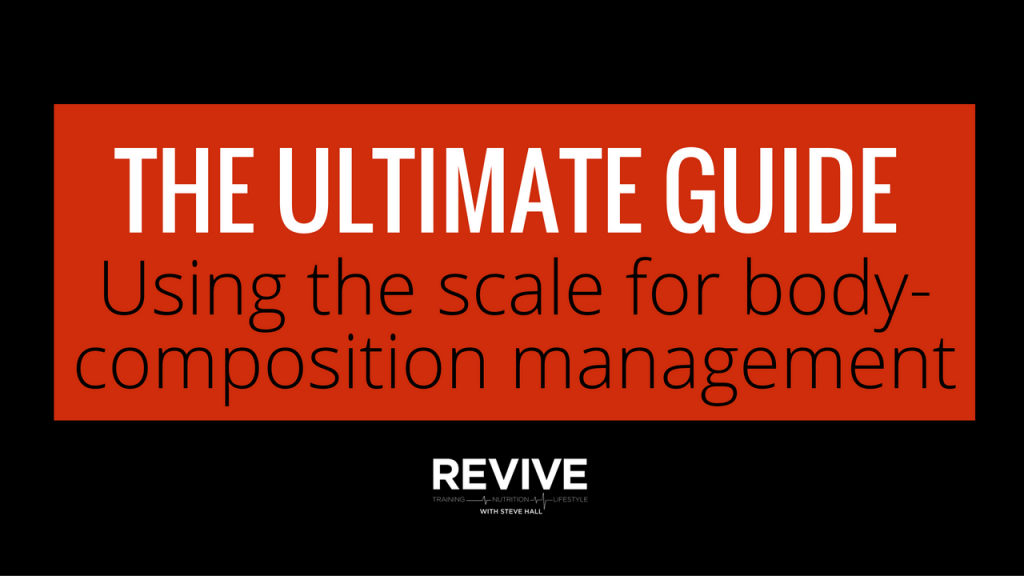
You dig out your weighing scale…
I think the scenario above presents a legitimate problem, a problem I am going to solve.
You see, I weigh myself every morning.
I do it, my clients do it, and I am going to recommend you do it too. There seems to be a lot of huff about the scale, I’ve even heard it called the ‘sad step’ <– f*ck that, it’s a weighing scale nothing more or less.
So long as you use the scale and the data it provides you right, it can be a very powerful tool for:
-
Table of Contents
Fat loss
-
Maintenance of fat loss
-
Muscle gain
Sure you can do it without, but you’re making your life unnecessarily hard.
1.] Body Composition Management
OK so you’re starting a fat loss diet, and you’ve been told not to weigh yourself.
How do you know things are going in the right direction?
Maybe you’re looking in the mirror, possibly feeling how clothes fit or taking measurements of your waist. Those are all great ways to help you track your fat loss progress, but what if you’re a little bloated? Clothes are going to feel tighter. How objective really is ‘how clothes feel’? And how long does it take you to realise whether something is happening?
What about the mirror? Again I think it’s great, but it’s also subjective and it can take quite sometime to identify change. In the same way taking a waist measurement is a valid way to assess progress, but real changes take time. All in all what I am saying is you could have been on your ‘fat loss diet’ for a month and actually maintained, but it took you that long to realise because you didn’t have any other way of assessing progress.
[bctt tweet=”subjective measurements are not the best when objective data is required” username=”revivestronger”]
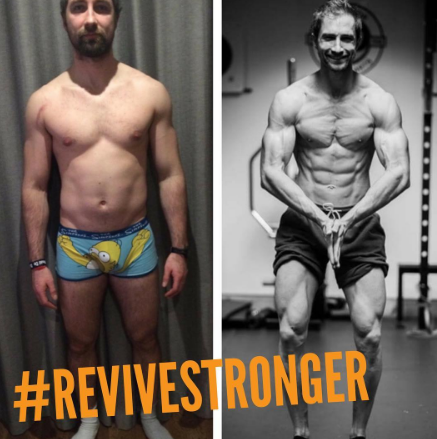
Or even worse, you were losing fat, but you didn’t think you looked any different or your waist measurement hadn’t changed and so you starting slashing calories early. “I look the same” — I’m adding an extra 2 hours of cardio and dropping 200 Calories…that’s a recipe for disaster and could lead you to maintain weigh on less than 1000kcals a day.
So as you can see, without the scale, we do not have a real time way of objectively measuring our progress. The same goes for gaining muscle, we might look at ourselves in the mirror, use clothes and measurements, but these things are all either a bit slow to change or subjective. We could be gaining way too fast, or not at all, and that’s a problem.
[bctt tweet=”the scale adds objectivity to our progress” username=”revivestronger”]
This is where the scale comes in, 9 times out of 10 to lose fat you will need to see a change in scale weight and the same is true for those looking to gain muscle, thus why would you remove such a powerful marker of progress? You can use the scale to give you an objective picture of what is going on, it can prevent you from; losing muscle, gaining fat and spinning your wheels.
It’s not just me and clients that have seen success in using the scale, in the article ‘STOP regain: are there negative effects of daily weighing?’ they concluded [1]:
“Daily weighing appears to be an important aspect of weight loss maintenance and was not associated with adverse psychological effects.”
In the same study it was found those who weighed in daily were associated with:
-
Decreases in depressive symptoms
-
Fewer binges
Self-weighing provides feedback of how what you’re eating and your current activity levels are impacting your weight, and this acts as a tool to allow you to make small adjustments to impact your energy balance i.e. if the scale isn’t going in the direction you want, you can adjust your diet or exercise.
2.] Do it daily
Hopefully you are somewhat convinced about the importance of weighing yourself.
If not, you will be by the end of this article, trust me.
However, if you remember I said I weigh myself every day, first thing, and get all my clients to do the same. Science also agrees; a recent review of the self-weighing literature indicates that daily self-weighing is associated with greater weight loss compared to less frequent weighing [2]. This next part is very important, and largely covers off a lot of the reasons people take a dislike to weighing themselves.
SO LISTEN IN!
-
FACT: you will not weigh the same every single day of the week
-
FACT: weight loss/gain is not linear (in the short term)
Those are two very important facts to remember, because they are all too often ignored and why people hate on the scale. It doesn’t take a genius to figure out that your weight will differ day to day, however a lot of people discount the fact weight loss or gain is not linear…at least in the short term.
[bctt tweet=”weight loss is not linear in the short term” username=”revivestronger”]
Think about it this way, Manchester United may win the Premier League this season (probably not but hey) to get there do they win every single game? It’s highly unlikely, within the season their performance will fluctuate, but the overall trend will be that they won. This is much like fat loss or muscle gain, the overall trend is down or up, but each weigh in might not be in the direction we expect. So just like the winner of the league is the team with the best average performance over the season, whether or not your weight is up or down is the average of your weigh ins.
So this is why daily weigh ins are so important, but should not be looked at in isolation.
Look at the above, this is a real life example from one of my online clients. Look at the highlighted cell, if my client was to only weigh in on that day of the week they would have thought they’d lost less than half a pound, when in reality when we take the average for the weeks we see they lost almost 1lb. This is a relatively non-extreme example, you could even get it where a person is up on the week prior on that day, but when you put it into context and take an average they’re down and it was just one freaky weigh in.
Sure you could argue that if you weighed in each month you’re bound to be down in weight (assuming you’re targeting fat loss) but that is assuming everything is on point each week, you could be down in a months time, but you could also maintain or even be up. It’s a long time to be potentially not moving further towards your goals.
Infrequent weigh ins are like loading up google maps and then it crashing, you’re lost most of the time
In the graph below you can see that those who weighed in everyday saw a greater loss in weight than those who weighed less than 7 days per week, the researchers noted:
“daily weighers reported greater adoption of weight control behaviors compared to those who weighed less often”
And that:
“even weighing 5 days per week, which was the average among the “non daily weighers,” led to smaller weight losses, and promoted less utilization of behaviors known to be associated with weight loss.” [3]
All participants were given the same information about making behaviour change necessary to see weight loss, but those who weighed in more frequently saw better results. Thus, by taking daily measurements and then averaging them out we get the best of everything and this allows us to best adjust things to keep progress going.
3.] Expect Fluctuations
You’re still with me right, we need to weigh in to give ourself an objective real time measure of progress and those weigh ins need to be daily due to fluctuations and to keep us accountable. These fluctuations should be expected, it would be more weird for me to see someones weight be the same every day than for it to be up or down by 5%.
Once you understand that weight changes are not linear and that fluctuations are to be expected you should be able to place less emphasis on the daily number you’re viewing. It might take some time at first, but soon you’ll be able to step on the scale, jot down the number and forget about it.
So why does our bodyweight fluctuate?
1.] Water – this is the main reason, some days you will be holding more water, others less. For example, when you eat out normally the food is higher in salt (especially if you like pizza like me), now when we eat salt our body requires more water to keep our bodies sodium levels in check, you drink more water, you hold more water, and consequently you weigh more the next day.
2.] Food – it goes without saying that food weighs something right? Well if you eat unusually late at night but weigh in the same time the next day, you may have more food in your digestive tract than usual, hence weighing more. On that note about the digestive tract, if you’re having trouble going to the loo (constipated) you could again be heavier, or if you’re finding it too easy to go to the loo (diarrhoea) the opposite could be true. Also anyone who has had a refeed knows they often weigh more the next day (but not always), this is because the increase in carbohydrate consumption leads to more glycogen storage in your muscles and with every gram of glycogen around three grams of water comes with it, leading to an increase in weight. This comes down a few days after once you get back into your usual calorie deficit.
3.] Stress – when we go through periods of high stress, our body holds onto more water. This could be work stress, or a lack of sleep, in which we produce more cortisol and this leads to water retention. Or it could be training stress, in that we have soreness in our muscles and the inflammation causes water to be retained.
4.] Environment – say you go on holiday, or suddenly a heat wave hits this can impact your scale weight. Say it’s hotter than you’re used to, but you don’t drink anymore to compensate for the extra sweating, this could lead to short term dehydration and consequently a drop in scale weight.
5.] Alcohol – this stuff plays tricks on our weight, a lot of my clients are shocked that after a night out drinking they often weigh less. This is because alcohol consumption more often than not leads to dehydration, and as stated above when we’re dehydrated, holding less water, we see a drop in scale weight.
6.] Hormones – we’ve already gone over some hormones above, but what I am talking about here applies to females. Due to your monthly cycle and changes in hormones your weight can fluctuate a lot. It is highly individual, some see little change, but some of you will know around that time of the month your weight shoots up. This is something to be aware of and I want to refer you to Lyle McDonalds post below:
7.] Medication/Supplementation – certain medication can cause you to hold water, for example NSAIDs promote sodium and water retention [4]. Furthermore, creatine monohydrate supplementation can cause noticeable water retention especially when loaded (cases of up to 5lbs are not uncommon). [5] So if you’re introducing something new be sure to keep that in mind.
As you can see, there are a huge number of ways our weight can fluctuate, and because we’re always looking in hindsight we can never actually know why our body weight changed like it did. However, that shouldn’t be cause for concern, it should allow you to focus on what matters most; sticking to your diet and training.
[bctt tweet=” focus on what matters most; sticking to your diet and training” username=”revivestronger”]
This wasn’t meant to be a comprehensive list of every single way or reason your bodyweight could fluctuate, it was to illustrate that there is huuuuuge number of factors involved with scale weight, heck I didn’t even cover the impact of where you measure in relation to the moon or what impact the age of your scale could have (lol).
4.] How to weigh yourself
It breaks my heart when I see someone weighing themselves with good intentions, but getting it completely wrong.
If you stick to this checklist you can’t go wrong.
5.] Using averages
Now so far I have introduced you to the idea of using a weekly average, so you can compare this to the week prior to assess progress. Which is definitely a great starting point, but not the only average I want or think you should be aware of.
The reason the weekly average is useful is because it squashes those nasty fluctuations that don’t really help us much, however, the reason it’s not the be all and end all is due to the fact there’s also larger trends going on. I’ll take you through some of the different ways you can use daily weigh ins and weekly averages to give you the best possible view of what is going on with your body composition.
Week to week
Comparing one weeks average to another works best for males who are not super lean looking to drop fat. Us guys don’t have to worry about hormonal cycles, and thus our weight loss is much more predictable and we can for the most part expect to see drops in our average weight week on week.
This becomes more complicated the leaner you get, largely because there is less fat to lose.
Bi-Weekly
Looking at averages across two weeks works really well for anyone looking to gain muscle. The fact is gaining muscle is slower than losing fat, typically 2 times as slow. It therefore makes sense to look over a longer time period, in addition if you’ve ever purposefully tried to gain weight somewhat slowly you might have noticed it often comes in ‘spurts’. Now I don’t have any literature to say why this occurs, but I’ve seen it myself, with my clients and heard experts like Lyle McDonald talk about it too.
Bi-weekly averages also help with very lean males, as they are losing weight at a slower pace.
Month to month
Females generally have a pretty regular cycle and as I said some women find they really hold onto a lot of water at certain times of the month. Now if they compared only week to week they might find that when that TOTM comes around they predictably see an increase. Due to this, it would be very wise for a female to look on a month to month basis, rather than weekly.
The more data you can collect and look over the better understanding you will have of your body.
Keep an open mind
I think it is incredibly important to keep an open mind about the data you’re receiving, for example if you’re a male looking to drop fat and your week on week average isn’t down, don’t assume you need to create a deficit again. Always keep an open mind and look at all the influencing factors:
- Did you eat out a lot last week?
- How accurate were you with your nutrition?
- Did you keep up your activity levels? etc.
If you did everything right, and you had been losing well weeks prior, it might just be your body holding onto weight before a ‘woosh’. Lyle McDonald has written about this strange effect extensively, in that:
So try not to jump the gun.
Likewise it isn’t like females can’t look at week to week averages, they totally can, but they must bear in mind their personal hormonal cycle and the impact that could be having. It’s about looking at everything in context and having an open mind about what could be going on.
One tool in the tool box
“I call the weighing scale the sad step”
^ You now know this is first rate garbage.
A weighing scale, is a device used to measure weight. It’s not something that provides anything but data, that should be used and collected appropriately. Only when it’s not used in a correct manner, or the data provided is not fully understood can it unfortunately promote feelings of sadness.
[bctt tweet=”A weighing scale, is a device used to measure weight.” username=”revivestronger”]
But to refer to it as the “sad step” is admitting defeat without giving opportunity for success.
Of which there can be great success.
How do you use & understand it appropriately?
1.] Fluctuations: Remember your body weight is not a set figure, and is expected to fluctuate. For that reason you should look towards trends and averages, as opposed to single spurts. Just like if you were to hedge your bets on a football team winning, you would look at their performance across the season, not one match.
2.] Hindsight: you know it’s a wonderful thing but you’re always just making a best guess at why your weight did what it did. You can never know, because there are so many potential factors involved. That isn’t something that should be a cause of stress, but a reason to be calm, because if you’re not f*cking your training & nutrition up, hey the fluctuation was probably something inconsequential.
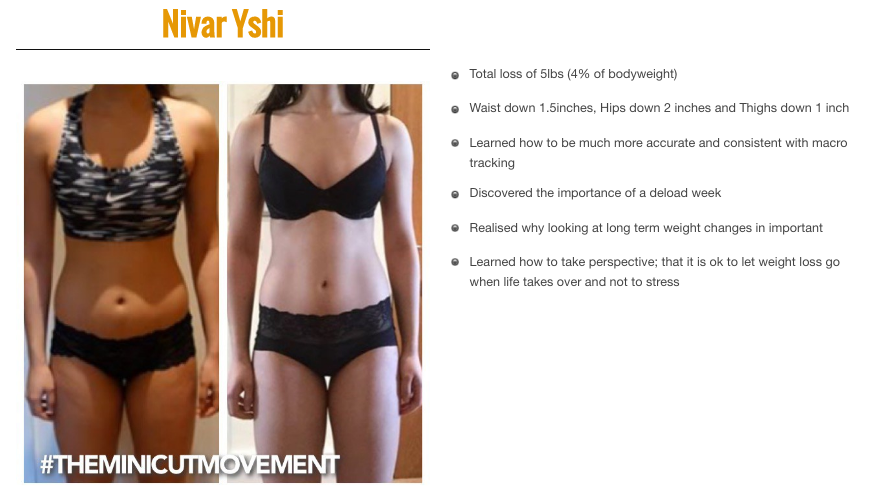
The scale should be used in combination with: pictures, how clothes fit, measurements etc. Just like you wouldn’t try and assemble a bed with only a hammer, you shouldn’t attempt to only use the scale to get to your body composition goals. Used in combination they can be particularly powerful and allow for better management.
[bctt tweet=”you can’t manage what you don’t measure” username=”revivestronger”]
For example if you’re measuring your waist and your weight and you find your weight has remained stable after a couple of weeks but your waist has come in an inch, you’ve probably lost fat and gained some muscle! Now that could well happen if it’s the first time you have dieted and trained in a ‘scientific’ manner and is awesome.
Just in the same way if your weight is going down but your waist measurement comes up you’re probably losing fat and made an error when measuring your waist or were bloated when measuring.
The key is using each tool in combination
…because as much as we don’t want it to be, the human body is complicated.
So don’t view the scale as anything but data, that when used and understood correctly can be a VERY powerful tool to manage body composition changes, one tool within a tool bag of course.
Because who the f*ck tries to build something great with one tool!
What Next?
- Learn how to set up your diet for fat loss – HERE.
- Learn how to set up your diet for mass gains – HERE.
- Learn how to set up your weight training for fat loss – HERE.
- Need help making weighing yourself daily a habit – READ THIS!
- Fancy a free DUP strength based training programme? – Get it for free – HERE.
One more thing…
Do you have a friend who would love the above? Share this article with them and let me know what they think.
[bctt tweet=”The Ultimate Guide: Using the scale for body composition management” username=”revivestronger”]
References
- J Consult Clin Psychol. 2007 Aug;75(4):652-6. STOP regain: are there negative effects of daily weighing? Wing RR1, Tate DF, Gorin AA, Raynor HA, Fava JL, Machan J.
- The impact of regular self-weighing on weight management: a systematic literature review. Vanwormer JJ, French SA, Pereira MA, Welsh EM Int J Behav Nutr Phys Act. 2008 Nov 4; 5():54.
- Dori M Steinberg, PhD, RD,1,2Gary G Bennett, PhD,1,3Sandy Askew, MPH,1 and Deborah F Tate, PhD2. Weighing everyday matters: Daily weighing improves weight loss and adoption of weight control behaviors. J Acad Nutr Diet. 2015 Apr; 115(4): 511–518.
- Kathleen M Knights,1 Arduino A Mangoni,1 and John O Miners1,2Non-selective nonsteroidal anti-inflammatory drugs and cardiovascular events: is aldosterone the silent partner in crime? Br J Clin Pharmacol. 2006 Jun; 61(6): 738–740.
-
https://examine.com/supplements/creatine/
We are a personal coaching service that helps you achieve your goals. We want you to become the best version of yourself.


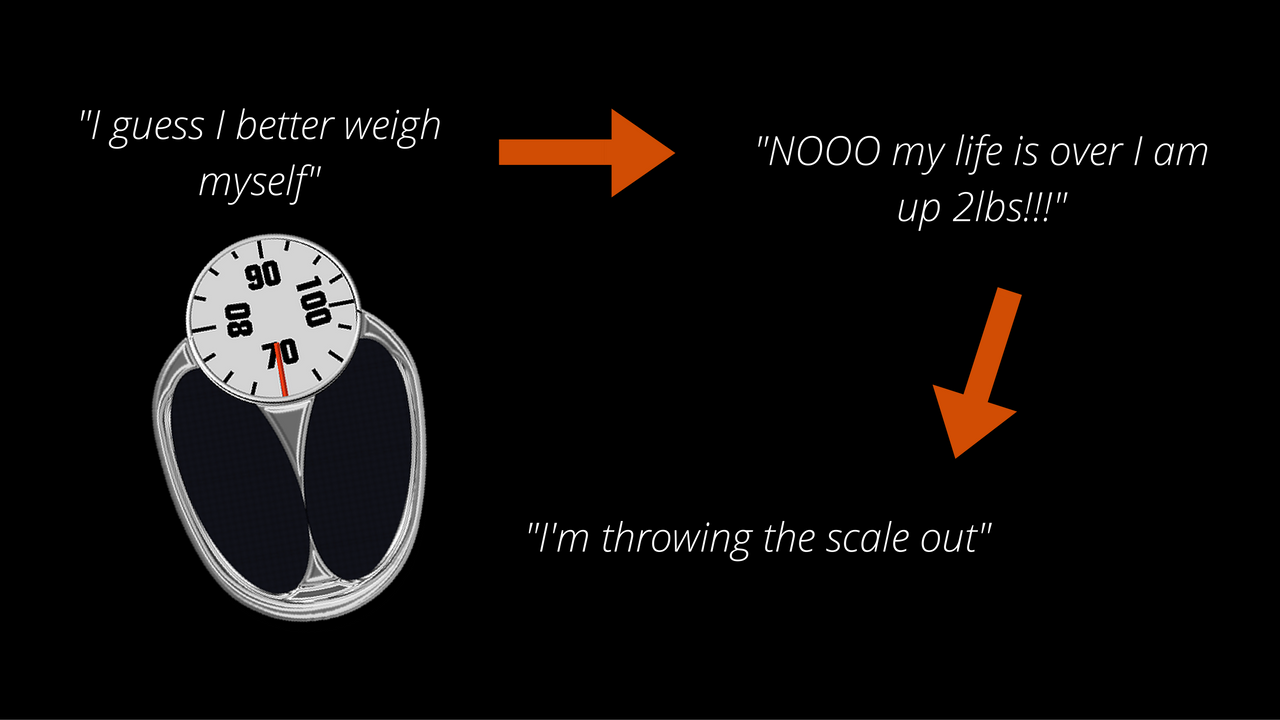
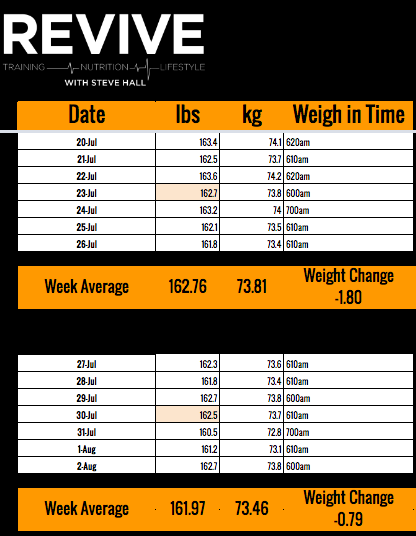
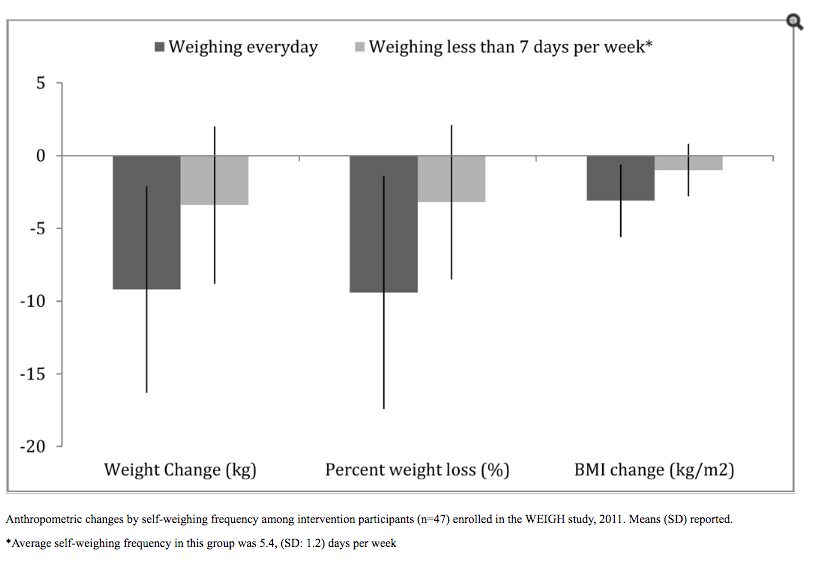

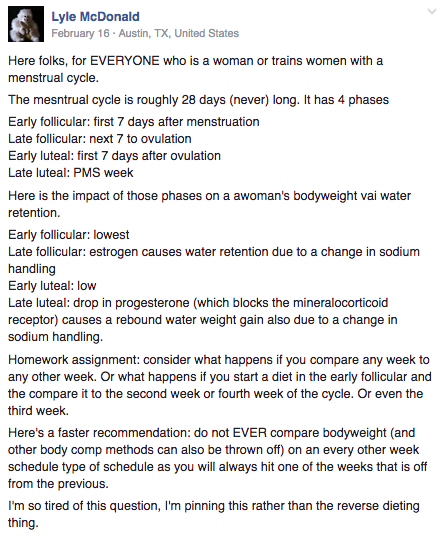
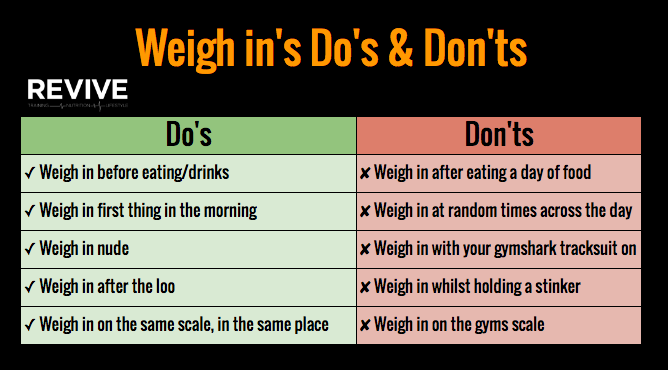





Comments are closed.